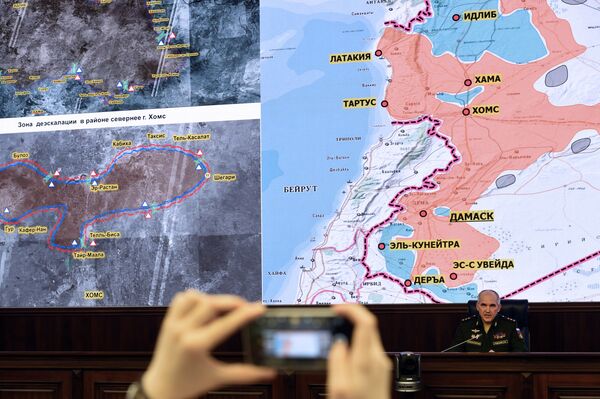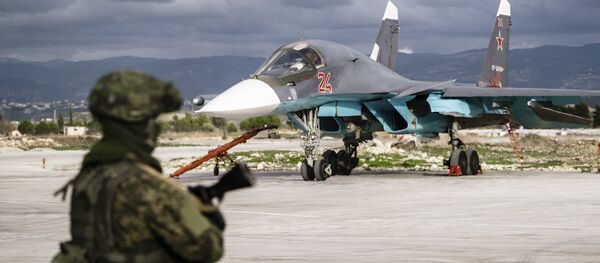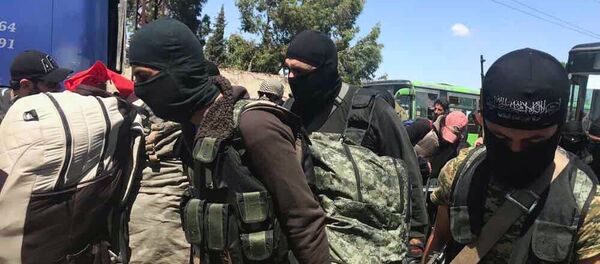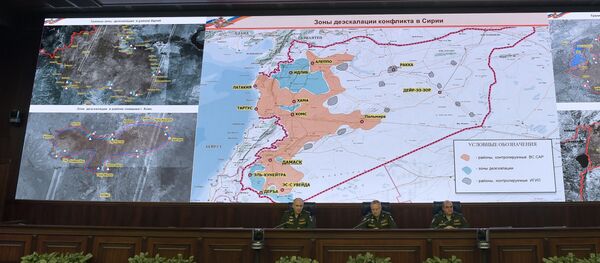On Friday, Deputy Foreign Minister and Special Presidential Representative for the Middle East and Africa Mikhail Bogdanov said that experts from Russia, Iran and Turkey will map the borders of the agreed-upon cease-fire or de-escalation zones in Syria.
The diplomat added that the checkpoints must be set in the mentioned areas to prevent armed infiltration of terrorists and secure the free passage of citizens.

Mikhail Bogdanov explained that the memorandum on the de-escalation zones states that the guarantor states, namely Russia, Iran and Turkey, should form a working group to study all the relative issues, including on who is responsible for ensuring security on the ground. The issue however still remains unclear.
Earlier in May, the diplomat said that Russia does not rule out that the United States will become a member of the working group on the de-escalation zones, this issue is under discussion.
"We have had to increase the amount of de-confliction work we are doing with the Russians given the tighter airspace that we are now working ourselves through," he said.
Iran however has opposed US' role in de-escalation zones in Syria.
"Secretary of Iran's Supreme National Security Council (SNSC) Ali Shamkhani underlined that Tehran will strongly oppose the US’ participation in de-escalation zones in Syria," the country's FARS news agency reported on Saturday.
"Syria has a government, and only it can decide who has the right to be present in their territory; the Syrian authorities do not want to see the Americans, who support terrorism and destabilize Syria, anywhere near them,” it quotes Shamkhani as saying.
Sputnik international affairs contributor Alexander Khrolenko reviewed the complicated situation on the ground.
"Some members of the opposition consider the Russian project a threat to the territorial integrity of Syria and renounce the peacekeeping role of Iran. The Americans and their allies have been pinned down to a fact: the zones are under Russian-Iranian control. Thus some regard the memorandum on the safe zones as 'yet another trap' of Vladimir Putin," Khrolenko writes in his article for Sputnik.
"Without having any alternative projects for Syria, the west can't openly oppose Russian-Iranian –Turkish plan, but, just in case, keep fuelling protests of opposition," he explains.
The journalist recalled that the Syrian rebels have recently vowed that they wouldn't agree to the presence of Russian and Iranian observers in Syria and doubted that Russia will stop bombing them.
"The above initiative of Washington and Ankara could have legalized the military presence of the US and Turkey in Syria and ensure the transfer towards the forceful ousting of the legitimate Syrian president (as it was in Iraq, Yugoslavia and Libya). That is why the US-Turkish no-fly zones are unaccepted," Khrolenko explains.
He further says that to be able to ensure the implementation of the de-escalation plan, Russia, Iran and Turkey will have to increase their military contingents in Syria, as certain terrorist groups, like the former al-Nusra Front, have no intention to observe the ceasefire.
Besides, the memorandum affects the geopolitical interests of Syria's influential neighbors, Israel and Saudi Arabia, which will definitely try to have their impact on the situation.
The author further recalls that Riyadh has recently made a multi-billion deal with the US on the deliveries of the US weapons and is planning to spend $350 billion on armament.
Israel, he says, is the only country in the Middle East which possesses the advanced US' five generation fighter jets F-35, and Tel Aviv shows no signs of stopping.
"The de-escalation zone in eastern Damascus could obstruct regular Israeli airstrikes on Hezbollah movement on the Syrian territory. And the show up of Iranian and Turkish observers on the Syrian-Israeli border would have been unbearable," the journalist explains.
By tactically complying with the Russian initiative on the peaceful settlement of the Syrian conflict, the US objectively diminishes the influence of Israel and the Persian Gulf monarchies in the region. In other words, it is affecting its own strategic interests in the Middle East, he says. Hence, it is still far from endgame in this geopolitical chess game, he concludes.
Meanwhile, Russia's General Staff of the Armed Forces has recently announced that it intends to increase the number of de-escalation zones in Syria.






